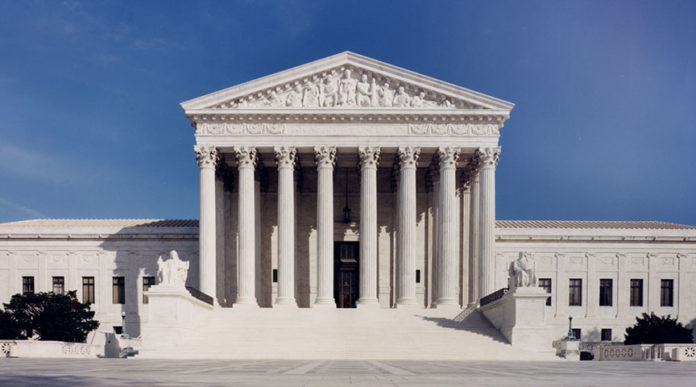President Joe Biden’s administration is urging the U.S. Supreme Court not to review a case that has implications for legislation in Kansas that would give local utility companies the first shot at building electric transmission lines that connect to their facilities.
U.S. Solicitor General Elizabeth Prelogar is asking the court not to take up an appeals court decision that found that a Texas law discriminated against interstate commerce because it banned out-of-state companies from building new transmission lines.
The Texas law, enacted in 2019, is different from a similar bill in Kansas because it only allowed incumbent electric companies with an existing in-state presence to build transmission lines.
Companies without an existing presence in Texas were not permitted to compete for transmission-line projects.
The 5th U.S. Circuit Court of Appeals ruled against the Texas law, which is now on appeal before the U.S. Supreme Court.
The solicitor general believes the lower-court ruling should be allowed to stand.
“The court of appeals correctly determined that (the Texas law) discriminates against interstate commerce by prohibiting any company without an existing in-state presence from competing in the market for the construction and operation of electric transmission facilities,” the solicitor general argued in a brief filed this week.
The Supreme Court has not yet decided whether to hear the Texas case.
Supporters of the Kansas bill believe it would not be affected by the Texas case although others believe that it could have distinct ramification for any legislation that might be passed here although that’s a long way from happening.
They point out that the Kansas proposal doesn’t ban out-of-state transmission owners, but it sets out an 18-month waiting period for the incumbent utility to get the necessary permit to build a transmission line once it submits a notice to build a line.

ITC Great Plains supported the Kansas legislation. It says there is no comparison to what Texas enacted into law and what has been proposed in Kansas.
The company says the Texas law went much further than the Kansas bill, which is modeled after a Minnesota law that was upheld by the 8th U.S. Circuit Court of Appeal, which has jurisdiction in a different part of the country.
The Kansas legislation “is good public policy to ensure local control in siting and building transmission lines to ensure that cost-effective, reliable energy is available for electricity consumers to power the state’s economy,” the company said in a statement.
The bill passed out of Senate committee earlier this year, but it wasn’t acted on by the full chamber. It could still be acted on next year.
ITC said the Kansas bill rejected the Texas approach and settled for a “courtroom tested, constitutionally approved law.
“Kansans deserve the same legal protections their Midwestern neighbors already have,” the company said.
But a legal expert who testified against the proposal in the Kansas Legislature believes there is potential fallout for the legislation in the Sunflower State even if the Texas statute differs from the Kansas bill.
Jim Rossi, who specializes in energy law at Vanderbilt University, said if the appeals court ruling in the Texas case stands, it wouldn’t control what happens in Kansas.
“But it ends up being pretty important national precedent with respect to constitutional challenges to protectionist state laws such as what Kansas was considering,” Rossi said in an interview.
“I think it raises questions about the constitutionality of those statutes such that any sort of out-of-state transmission line developer, any sort of out-of-state energy supplier who is concerned about the lack of transmission expansion could potentially sue,” Rossi said.
“It raises some uncertainty about transmission policy in the state of Kansas going forward if Kansas were to adopt such a law,” he said.
Rossi acknowledged there is a difference between what was proposed in Kansas and what was eventually enacted into law in Texas.
He said there were characteristics in the Kansas bill – namely the 18-month waiting period – that could make the legislation legally vulnerable.
By comparison, the Minnesota law provides 90 days for a company to notify state regulators of its intent to build a transmission line once it’s approved. The company would have another 18 months to file for the necessary permit.
The Kansas bill “doesn’t ban out-of-state transmission owners,” Rossi said. “I think it erects considerable barriers to entry for them.”
The waiting period, he said, could ultimately be an impediment to building a transmission lines as economic conditions change over time and potentially foreclose on the possibility of an out-of-state company from building a line.
The Texas law started at the time NextEra was set to build a proposed 500-kilovolt transmission facility in east Texas that would connect to existing facilities owned by Entergy Texas, Inc.
NextEra challenged the Texas law in court and opposed the Kansas right-of-first-refusal law earlier this year. The company would not comment for this story.
The Kansas proposal had support from the Kansas Farm Bureau and many of the state’s utility companies, including Evergy, which also would not comment.
On the opposite side of the issue was the Kansas Chamber of Commerce, Americans for Prosperity and Spirit AeroSystems and a coalition of heavy power users.
The Kansas Chamber of Commerce still had its reservations about the proposal.
“Competition has been the backbone of America’s success. It works in every industry, and somehow we are supposed to believe that transmission systems are immune to the benefits of competition,” asked Alan Cobb, president and CEO of the chamber.
“That’s a pretty tough argument to make, especially when the government has historically taken action to break up businesses that gain too much control to truly face a competitive market,” Cobb said in a statement.
The decision in Texas reflects a split between judicial circuits over how this issue is viewed by the courts.
LSP Transmission Holdings claimed the Minnesota law not only discriminated against out-of-state transmission companies, but also imposed an undue burden on interstate commerce.
The transmission company appealed to the U.S. Supreme Court, which refused to hear the case in 2021.
Rossi wasn’t so sure that the difference in circuits would mean the court would take up the case, given that the facts vary.
“The court allows differences in outcomes across circuits to stand all the time,” Rossi said.
“It’s not about the court applying a different legal test. There’s no difference in terms of the legal analysis.”
“The difference between the 5th Circuit and the 8th Circuit is about the facts in my view,” he said. “It’s not about a really important issue of law that the Supreme Court needs to accept this case to resolve.”















